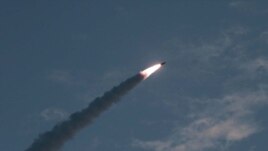31 July, 2019
A group of military experts is proposing that the United States share its nuclear weapons with Japan and South Korea to answer the nuclear threat from North Korea.
The experts' comments appear in Joint Forces Quarterly, a publication of the National Defense University. It notes that the opinions expressed in the article are not the official policy or position of the U.S. government.
In talks with U.S. officials, North Korea agreed not to test nuclear arms and long-range missiles. Yet the country apparently launched short-range missiles on Wednesday.
North Korean leader Kim Jong Un has met three times with U.S. President Donald Trump. Their most recent meeting took place in June in Panmunjom, along the border between North and South Korea.
But the North has been slow to get involved in talks aimed at working out details of ending its nuclear weapons program. The U.S. government has offered to lift economic restrictions on the country once the program is suspended.
Experts: US should consider sharing
The four military experts expressed their opinions in an article called "Twenty-first Century Nuclear Deterrence." The four serve in the U.S. army, navy and air force.
They wrote that: "The United States should strongly consider...sharing of nonstrategic nuclear capabilities during times of crisis with select Asia-Pacific partners, specifically Japan and the Republic of Korea."
The Republic of Korea is the official name for South Korea. The term nonstrategic mainly describes weapons, like bombs, that can be dropped from warplanes.
The idea of the U.S. sharing nuclear arms with Japan and South Korea would involve deploying the weapons to the countries so they could be used in a nuclear war. The idea is similar to how the U.S. shares nuclear weapons with some members of the North Atlantic Treaty Organization (NATO).
The U.S. has promised to protect Japan and South Korea against nuclear attack. It also operates major military bases in both countries.

A view of North Korea's missile launch on Thursday, in this undated picture released by North Korea's Central News Agency (KCNA) on July 26, 2019. KCNA/via REUTERS ATTENTION EDITORS - THIS IMAGE WAS PROVIDED BY A THIRD PARTY.
The article on the proposal to deploy U.S. nuclear weapons in East Asia was released on July 25. That is the same day North Korea launched two short-range missiles. Early Wednesday, South Korea's Joint Chiefs of Staff reported that the North launched several missiles from its eastern coast.
The military experts suggest that American nuclear sharing with Japan and South Korea could be based on the NATO model with a few differences.
Currently, the U.S. shares nuclear weapons with Belgium, Germany, Italy, the Netherlands and Turkey. The NATO alliance now has a total of 29 member-states.
The article suggests that a possible nuclear weapons agreement in Japan and South Korea could be based on the agreement with NATO. Both the U.S. and the host country would need to agree to any possible use of the weapons. But some details may need to be changed for the East Asian allies.
Japan and South Korea dispute trade, history
The article suggests that nuclear sharing with Japan and South Korea would improve a "military partnership through joint-regional exercises" needed to deter North Korea. It also suggests that the move would provide a strong reason for North Korea to continue with negotiations to end its nuclear program.
However, arms control expert Gary Samore said the timing may not be right for the proposed nuclear sharing because of the current trade dispute between Japan and South Korea.
Trade tensions between the two countries increased after Japan ordered restrictions on products exported to South Korean companies. The parts affected are needed in the manufacture of smart phones and high-technology devices.
The dispute has its roots in Koreans' anger over the Japanese occupation of their country from 1910 to 1945, and its use of Korean forced labor during World War II.
South Korea's Supreme Court approved the seizure of Japanese-owned property to pay South Koreans who were affected. To answer the export restrictions, many South Koreans are boycotting Japanese products. Those boycotts have become widespread in Seoul.
U.S. Secretary of State Mike Pompeo is traveling in Asia this week. Pompeo has said he would like to see Japan and South Korea "find a path forward" from the dispute.
Samore said, "There may come a time when the domestic politics in South Korea and Japan have changed especially when North Korea continues to maintain...nuclear weapons."
He said, at that point, such an agreement would "make more sense."
I'm Mario Ritter Jr.
Kim Dong-hyun reported this story for VOA News. Mario Ritter Jr. adapted it for Learning English. George Grow was the editor.
_____________________________________________________________
Words in This Story
article –n. a piece of writing about a subject that is in a magazine, newspaper or other publication
capabilities –n. relating to devices or abilities that permit a person to do something
specifically –adv. in a definite, exact way
host –n. a person or country which accepts someone or something into their home or nation
deter –v. to cause someone to decide not to do something
domestic –adj. related to one's home country
We want to hear from you. Write to us in the Comments section, and visit 51VOA.COM.